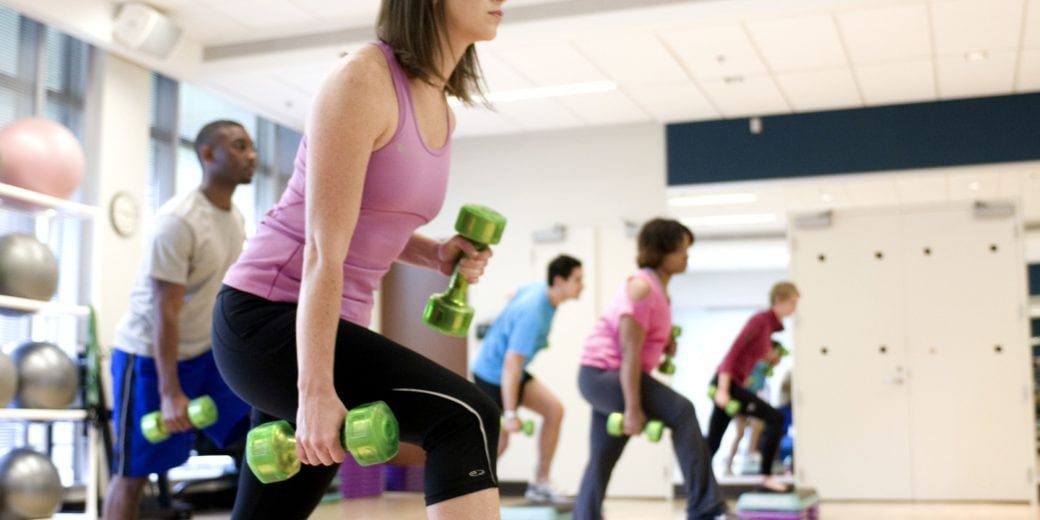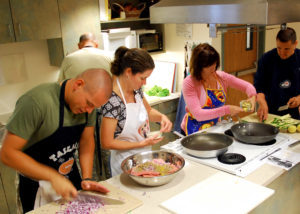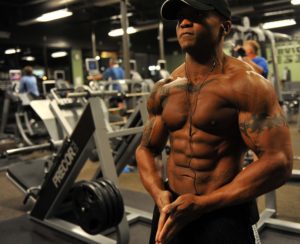Exercise Health Control to Spice Up your Work Out

Exercise is both a past-time and a discipline which in some ways is similar to cooking.
Spices should be used sparingly in a dish as you risk ruining the taste and flavor.
A workout regimen works in a similar fashion,
as such should be approached in moderation with any addition being a disciplined consideration.
Exercising health control is a necessary skill that each aspiring bodybuilder or anyone who simply wants to stay fit needs to learn and master.
There are things you need to remember that a workout is just like trying out a new recipe, you cannot get the taste correctly in the first try unless you know what you are doing.
In a similar sense, you cannot get the results you are after in a gym if you carelessly just do things willy-nilly, without proper research, consulting specialists in the field of healthcare and sports science, and by simply ignoring the fact that each body is different and reacts differently to certain workouts and should be treated as such.
In this article, we will present you with some practical advice you can apply to your exercise routine.
Be Wise, Consult before you Indulge in Exercise

In most cases people oftentimes go to a gym and start working out without consulting a physician before starting a regimen.
While in general practice this works for a large majority of individuals,
It can actually put certain people at risk for developing or causing future health issues such as osteoarthritis.
Although science has proven that exercise in most cases does more good than harm to the joints. The correlation between joint damage and exercise is hard to pin down.
Arthritis expert from Sydney, Professor Patrick McNeil said on an article published in the Australian web portal of ABC mentions,
“The relationship between exercise and cartilage loss is complex. For most people, exercise helps joints stay healthy. But in some instances, it could be harmful,
When the alignment of a joint is incorrect – perhaps because of weakened muscles or because you were born with unusually shaped joints – it’s feasible movement might have some role in wearing cartilage away. But a person may also need to have a genetic predisposition for this to happen.
You could be born with cartilage that will last, no matter what you do to it. Or you could be born with cartilage that’s less durable.”
He also mentioned that even if your joints are perfectly aligned, it can change after an injury, but then added that,
“The bottom line is that the evidence so far doesn’t suggest a strong connection between simple repetitive use of a joint and the development of osteoarthritis.
So if your joints aren’t bothered by the exercise you’re doing, it’s unlikely you’re doing them harm.
But if you have already been diagnosed with joint damage, or have pain that suggests it, it’s possible the wrong sort of exercise could make your arthritis worse.”
You can read the full article Here.
You should never compare your body to others as in the case being pointed out, osteoarthritis barely covers the tip of the iceberg and knowing more about your body would help minimize the risk of developing problems as you go about your exercise routine.
It is wise that before you decide to start hitting the gym you should consult your physician first or get a complete physical as knowing more doesn’t actually hurt you one bit.
A little knowledge about your health is the key to preventing serious complications which may arise from doing the things you do now.
So know your roots first before growing those muscles.
Drink Water, only when Thirsty

While Dehydration is a serious risk that one must consider, you are hardly in any danger of becoming dehydrated if you have access to drinking water and free from any diseases or illnesses.
Although keeping hydrated is crucial for the body to function properly, it is not advisable to constantly drink water particularly when exercising.
This is due to the internal body mechanism involved in preventing us from becoming dehydrated also keeps us from losing so much fluid during exercise or in times of stress which then leads to becoming too hydrated.
Over-hydrating during exercise can actually cause a condition called Exercise Associated Hyponatremia where the body stores so much fluid and there are not enough electrolytes in the blood that it begins to affect normal body functions.
This imbalance can cause symptoms ranging from general body weakness, nausea, headaches, and in extreme cases seizures and coma.
Although death from hyponatremia is actually very rare, it is for this reason that it is seldom considered a threat.
It is also not true that the more you drink the more you pee.
The urinary system cannot directly process the water your body has stored in the past few hours from drinking gallons upon gallons of water.
The organs involved have a limited capacity and contrary to what people will tell you, the urinary system does not work like a hose where the extra water just gets flushed away instantly.
In fact, it is a complicated process of filtration and storage somewhat like a sewage treatment facility.
The water you drink is absorbed by the intestines which is then filtered by the kidney through the bloodstream,
the extra water together with the impurities then traverse the ureters to the urinary bladder where it is stored until fully filled,
a process which takes an hour to several hours to complete.
The urinary bladder can only store up to 400 to 600 mL and an average sized bottle of Gatorade is around 590 mL.
So what happens to the extra fluid?
The fluids are actually stored in the spaces in between the tissues which creates a sort of bloating effect,
more so during exercise since the body is on water conservation mode as explained earlier.
The only time urine quickly passes through the system is when you are under the effects of diuretics or if you have an illness such as but not limited to urinary incontinence which is also known as involuntary urination.
While keeping hydrated keeps our body functioning properly, drinking only when thirsty especially during exercise can help prevent weight gain due to water retention and possible serious complications from overhydration.
Change of Mindset, What Comes in Doesn’t Easily Come Out

While it is good to exercise and burn the calories, exercise doesn’t actually doesn’t help you lose weight.
Recent studies have shown that what you initially consume actually takes time to get out of your system than previously thought,
It is like an unwanted house guest which might not be as easy to remove than you think.
Newer studies however found that the relationship between weight loss and exercise is insignificant.
This is strongly tied to the compensatory behavior of our body when using up energy from exercise.
Everything we do from walking to even sleeping takes a bit of our energy bank and heavy exercise takes a huge chunk of that bank.
Once it reaches critical levels our body goes into conservation or scavenge mode.
Conservation being that our body and mind would want to avoid beneficial but energy depleting activities.
These includes using the elevator over the stairs, taking the car than walking or hiking, and even just directly going to sleep.
This affects how our body manages our fuel stores and it doesn’t have any long lasting consequences on the body, but it does have a direct effect on the exercise habits we are willing to endure.
Naturally, the body is efficient at managing our energy through hunger and sleep.
It only becomes ineffective when it constantly experiences critical energy depletion
.
This is commonly caused by lack of sleep, not eating properly, stress, and over exhaustion.
No one should work out more than what their body will allow and doing it longer, faster, or even in prolonged periods of time does not help the body or yourself in the long run.
Studies have shown that with proper diet and eating meals at regular intervals have been known to help foster weight loss as well as avoiding over exhaustion and getting enough sleep.
The latter being strongly linked to the fact that not having enough rest makes people hungry.
The body enters not only conservation mode but also activates scavenging mode.
During this time the body will react differently to hunger as it becomes an opportunistic eating machine.
Its goal not only to regain the energy lost but also to store more energy to maintain and fix the body.
This causes the body to go on a binge eating frenzies and for a short time turns off the ability to discern whether it is full or not.
Such unhealthy lifestyle choices if left unchecked can get out of hand.
This in turn makes the body unable to manage itself properly.
Energy storage becomes ineffective and balancing energy needs of the body becomes difficult.
This eventually leads to weight gain and over exhaustion which continues the cycle.
Experts suggest that in order to combat this problem one needs to:
- Exercise in short but manageable bursts.
- Develop an active lifestyle not purely based on exercise alone.
- Proper nutrition
- Healthy management of lifestyle choices.
Listening and knowing your body is the key to staying fit.
As it is not just a lifestyle choice.
It is also a mental discipline of staying healthy and cooperating with your body.
Building it, a Step at a Time and Facts on the Mind

In order to develop a successful exercise routine you must always practice safe and regulated forms of workouts.
While there are already quite a number of workouts available as of the present.
Such as different variations of bench presses, jumping jacks, and assisted exercise routines which use equipment like kettle bells and even rubber balls.
It is good advice to not easily jump the bandwagon without learning the ropes.
First, you must know the core muscle groups and how these exercise targets them
Then, assess for yourself or with a professional if you are ready for them or if you need additional training.
Second, some exercise have an associated level of difficulty, so you check first if you are able to perform them.
Be proactive and seek advice from a trainer or seek help from experts if you doubts.
Third, always take note that certain exercise can actually cause harm.
An exercise if not properly or safely performed can cause temporary or permanent injury.
It is imperative to always put your safety first and make sure you are well-prepared.
So give your body time to heal in between workouts to help it grow muscle tissue and for your body to slowly adjust to the new workout.
Lastly, A cardinal rule in working out is to never confuse nor compromise your short-term gains with long-term benefits.
Sculpt Your Body, Not Build an Ideal Imagination

Although a large chunk of us would want to look like their favorite celebrities.
It should not be the only reason you wish to improve on yourself.
Your body is as different as each snowflake are to each other.
You must understand that you have your own limits.
This is largely dependent on your body type, genetics, bone structure, so on and so forth.
While idolizing someone and wanting to be like them is good for inspiration.
You must keep it grounded to reality.
Avoid overindulging on your fantasies as it may cause you to forget the purpose of hitting the gym.
The aim of working out is to develop a healthy lifestyle and positive outlook.
It should not be about imitating someone from a magazine.
Always be proud of your hard work and labor.
It takes time to build a perfect body,
so don’t waste it in dwelling on negatives and instead focus on the positives.
You are as unique as they come.
In the end you should never despair if you don’t end up looking like the people in magazines.
Instead be proud of what you have accomplished.
Never give up as you will only gain regret,
Never settle for less as you will never gain more than you deserve,
and lastly never think that it is over as life is a continuous journey to perfection.
– Health and Fitness Vitality –
ADDITIONAL READING:
Know Your Body:
- Know what to eat Before, During, and After Your Workout
- What is Your Body Type
- Pre-Workout Fuel
- 50 Must Know Fitness Tips
Health and Safety:
Technical Notes:
Related Links:
- Workout Tips For Beginners; Weight Training, Exercise Definitions and More
- Understanding The Biology of a Great Muscle-Building Workout Diet
- The Top 30 Fitness Tips You Must Start Doing
